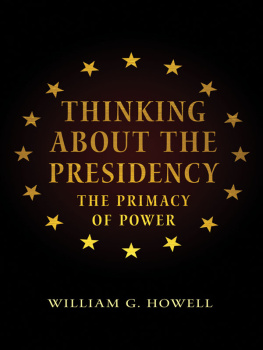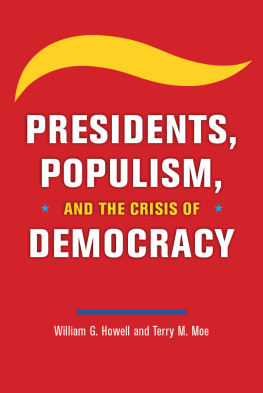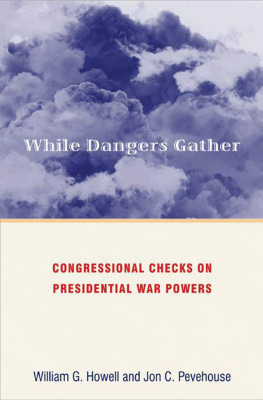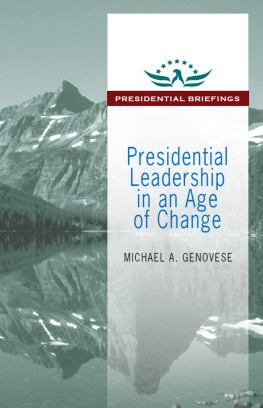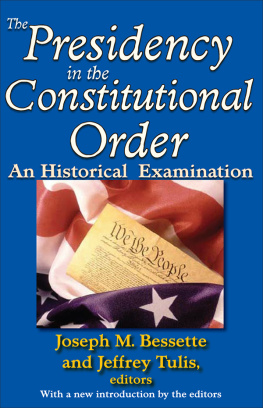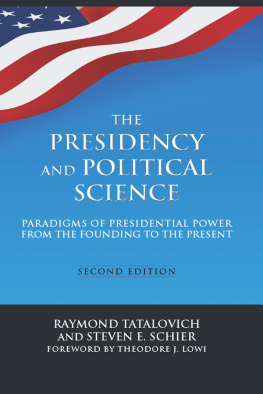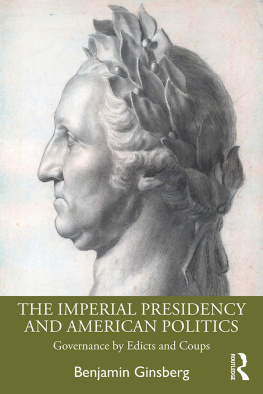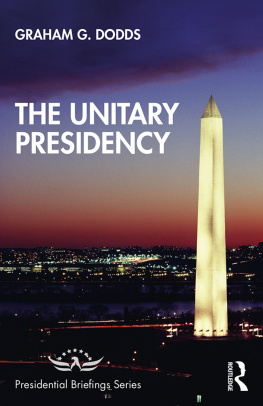Copyright 2013 by Princeton University Press
Published by Princeton University Press, 41 William Street, Princeton, New Jersey 08540
In the United Kingdom: Princeton University Press, 6 Oxford Street, Woodstock,
Oxfordshire OX20 1TW
press.princeton.edu
All Rights Reserved
Second printing, and first paperback printing, with a new preface by the author, 2015
Paperback ISBN 978-0-691-16568-4
The Library of Congress has cataloged the cloth edition of this book as follows
Howell, William G.
Thinking about the presidency : the primacy of power / William G. Howell with David Milton Brent.
pages cm
Includes bibliographical references and index.
ISBN 978-0-691-15534-0 (hardcover : alk. paper) 1. PresidentsUnited States. 2. Executive powerUnited States. 3. United StatesPolitics and government.
I. Brent, David Milton. II. Title.
JK516.H675 2013
352.230973dc23 2012042074
British Library Cataloging-in-Publication Data is available
This book has been composed in Palatino
Printed on acid-free paper.
Printed in the United States of America
3 5 7 9 10 8 6 4 2
Preface to the Paperback Edition
A s they are with every presidential election, the stakes of 2016 are prodigious. The United States faces extraordinary challenges both at home and abroad, and the two major parties offer radically different plans for the nations future. Where we wage war next, what tax rates we pay, whether we make any serious headway on the issue of climate change, and so much more besides, likely depends on whether we elect a Republican or Democrat to the White House.
In the next presidential election, however, one thing does not hang in the balance. Whomever assumes office in January 2017 will not disavow the extraordinary powers intermittently seized and nurtured by Obama in the last seven yearsnor those by Bush before him, Clinton one step further removed, or any of the long string of power-seeking presidents who have occupied the White House during the modern era. Regardless of heror perhaps hisaffiliation, the next president will continue to pursue the expansion of presidential power. She (or he) will have no choice.
In the larger project of building presidential power, the dominant trends have been ones of consistency rather than disjuncture. All presidents, no matter their partisan differences, their personal backgrounds, their leadership styles, or their rhetorical flourishes, want all the power they can acquire. While members of Congress regularly relinquish their own powers, and while judges do their best to avoid purely political fights between the various branches of government, presidents stand apart in our politics by guarding all the power they have acquired thus far while canvassing the landscape for opportunities to seize still more.
Why do presidents behave this way? And why dont they heed those who would counsel self-restraint? This short booka long essay, reallyoffers one explanation.
Presidents care so much about power not because of who they are, but because of where they sit. The reasons why presidents are so preoccupied with power are institutional rather than personal in nature. If we are to make sense of this relationship, then we must think institutionally about the American presidency. We must investigate the expectations to which they are held, the system of government in which they operate, the incentives that govern their actions, and the constraints that they invariably confront. The point here is decidedly not to advance any normative objective, an option about which Ill have more to say shortly. Rather, it is to get clear about how our presidents can be expected to behave, whether or not we like their method or aims.
Vested with so few enumerated powers within the Constitution but expected to deliver the nation from every conceivable threat, presidents are put in an impossible position. Their only hopehowever tenuousis to build their power; to read Article II powers in the most expansive way possible; to gladly invite every speck of authority that Congress willingly delegates, and then fight fiercely against any subsequent thought of retraction; and to strike out on their own, erecting new methods of writing and implementing public policy in ways that marginalize their political opponents.
Presidents care about power for the instrumental benefit it delivers rather than any intrinsic value it confers. For presidents, power has a purpose. In fact, it has multiple purposes. With power, presidents can take steps toward sating the publics appetite for leadership. With power, presidents can advance policies designed to address the trenchant social problems that Congress either ignores or trips over itself trying to solve. And ultimately, with power, presidents can build a legacy.
In the absence of power, presidents can expect all sorts of opprobrium from allies and opponents alike. Lacking power, presidents must watch with dismay as Congress lays waste to their policy agenda. And lacking power, presidents can be reasonably assured that history will forget them.
OBAMAS CONTRIBUTIONS TO A MORE POWERFUL PRESIDENCY
Seeing one of their own assume the presidency in 2009, constitutional law scholars and liberal Whigs anticipated that Barak Obama would restore some semblance of balance to our national politics. And for some time, he gave them reason for optimism. His rhetoric, at least, was a good deal more inclusive than his predecessors. Gone were the repeated invocations of the unitary executive, so prominently displayed in the legal record of the Bush White House; as was the bluster and triumphalism that, for liberals at least, seemed to define Bushs public posture.
Obama also went out of his way, at least during the start of his time in office, to reach out to Republicans, to enlist their support, and to appear generally conciliatory. However scripted or insincere they may have been, his efforts to appeal to his putative opponents had been evident since his debut on the national stage, when he reminded the Democrats assembled for their 2004 national convention of their basic commonalities with Republicans. Four years later, upon accepting the partys nomination, he reemphasized the point. Democrats, as well as Republicans, will need to cast off the worn out ideas of the past, he proclaimed. Come his election, the rush to reconciliation persisted. With both parties recognizing the need for some kind of government intervention in the wake of the economic crash, the president told Republicans to expect a plan with copious tax cutstheir policy tool of choice. The final package, however, did not satisfy Republicans, and they voted unanimously against it.
And so a pattern developed, wherein overtures toward reconciliation, often initiated by the president, yielded nothing in return. The olive branches were gradually abandoned. Im an eternal optimist, the president told a reporter about his gestures toward the Republicans. That doesnt mean Im a sap.
The fallout from the repeated inter-branch negotiations over the debt ceiling may have finally convinced Obama to renounce his conciliatory ways for something more hard-headed. At that point in the summer of 2011, when the nation nearly defaulted on its loans and saw its credit rating downgraded, Americans regarded the president as a reduced figure, left to shuffle in the shadows. That kind of perception could not be countenanced. In the aftermath of this near meltdown, Obama renounced his former ways and declared his intent to act when and where Congress would not. Rather than temper the use of presidential power, Obama would extend it. And rather than functioning as an afterthought, opportunities to act independently stood at the very center of the presidents attention. He made no qualms about saying so publicly, as he put it, I have a pen and I have a phone, and he had every intention of using them both. (The debt ceiling battles are discussed at length in chapter 6.)

